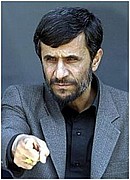Sunday
Aug292010
Iran: Ahmadinejad Attacks Rafsanjani & "Corrupt" Foes; "Overthrowers Have Not Been Punished Yet" (Kamdar)
 Sunday, August 29, 2010 at 15:05
Sunday, August 29, 2010 at 15:05  Writing for Rooz Online, Nazanin Kamdar draws from Iranian newspapers to report on the continuing tension within the Iranian political system, with the President lashing out and threatening others:
Writing for Rooz Online, Nazanin Kamdar draws from Iranian newspapers to report on the continuing tension within the Iranian political system, with the President lashing out and threatening others:In his speech [this week], Mahmoud Ahmadinejad implicitly referred to Hashemi Rafsanjani and Nategh-Nouri as “corrupt” politicians and announced that “overthrowers have not been punished yet”. Overthrowers is the term he uses for the leaders of the reform movement in Iran. Ahmadinejad made these remarks to a small group of people at an event that was boycotted by even right-wing and military groups because of the “engineered invitation from Mashai,” a reference to Ahmadinejad’s senior trusted advisor [Chief of Staff Esfandiar Rahim-Mashai]. Nevertheless, the administration’s official news agency described the meeting as an “intimate gathering between the president and various student groups.”
At the meeting, Ahmadinejad spoke about events leading up to the election: “I revealed the names of corrupt politicians in the debates,” he said. In the nationally televised presidential debates in 2009 incumbent Ahmadinejad mentioned Hashemi Rafsanjani and Nategh Nouri in his debate with Mir Hossein Mousavi, a gesture that was criticized even by Ayatollah Khamenei at the famous June 19, 2009 Friday Prayers.
According to Jahan News, Ahmadinejad commented on his decision to show Zahra Rahnavard’s picture by saying, “Some people told me that showing a woman’s picture was an act of haraam [religiously forbidden], but what I showed was just a photocopy of her identification papers and didn’t show anything in particular.”
Raja News quoted Ahmadinejad as saying, “While the conspirators continue their activities, some people think that they are finished and they must attack the administration.and can’t find a wall shorter than Ahmadinejad’s wall.”
Without naming Rafsanjani by name, Ahmadinejad said, “The fight against corruption has not ended. The thieves and overthrowers have not been punished and are active. So if we don’t act in time, the conspiracies will overcome us. Thus it is imperative that we move on ahead to make ourselves immune from the reach of conspiracies. The important issue is not to build an empire when we attain power, even though unfortunately this was done again in the ninth administration.”
He added, “Some people played in the enemy’s field without paying attention to the country’s most pressing issues. Today, the biggest overhaul in our country’s economic and cultural underpinnings is taking place; the fundamentals are changing and a true revolution is happening in our culture. As such, peripheral issues cannot overshadow the main issues….The real battlefield in the world is over global supremacy and globalization. Today, Iran supports globalization more strongly than Westerners.”
According to unpublished reports on online media portals affiliated with the conservative camp, Ahmadinejad’s latest meeting with a group of “students” was not free from controversies. The controversies relate to the infighting in the conservative camp over Mashai, which Mir-Hossein Mousavi has referred to as a “war of words” .
Jahan News explained some of the behind-the-scenes controversies that led to the meeting’s boycott by some government factions: “Prior to the meeting, the person that contacted students to invite them to the meeting was the former manager of the website Nowsazi and editor-in-chief of Hemmat magazine. It must be noted that this is the first time that students are invited via telephone and unofficially. This person also played a key role in managing the president’s interactions with journalists.”
Hemmat magazine (short for Tactical Nuclei of Resistance) was an extremist magazine supporting Ahmadinejad which unleashed massive attacks on Hashemi Rafsanjani in two back-to-back issues last year but was immediately suspended on Ayatollah Khamenei’s orders. The magazine’s editor-in-chief, Ali Sinaian, was also summoned to court following the suspension.




